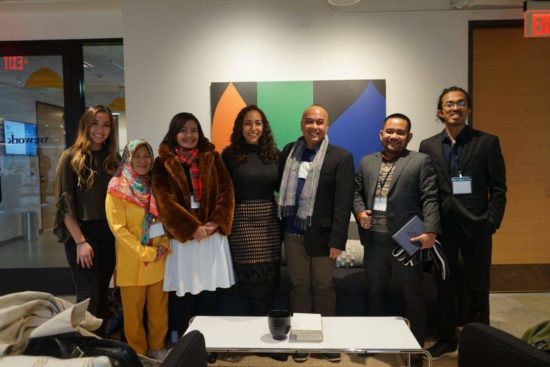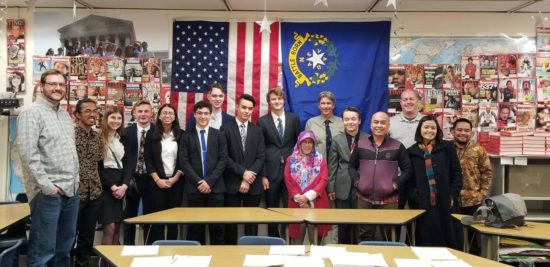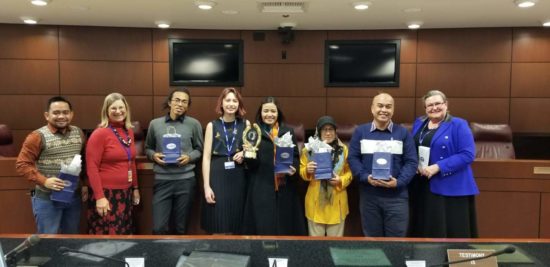By Fanny Syariful Alam, Regional Coordinator, Bandung School of Peace Indonesia
Editor’s Note: Fanny Syariful Alam is an International Visitor Leadership Program (IVLP) alumnus from Indonesia. His IVLP, “Youth Political Engagement in the Digital Age: a Project for Indonesia,” was organized in January 2020 by Graduate School USA in collaboration with the World Affairs Council of New Hampshire, Northern Nevada International Center, and Iowa International Center. Fanny is also a columnist, social activist, and regional coordinator at the Bandung School of Peace Indonesia—an organization that supports and encourages youth engagement in civic life.
All images provided by Fanny Syariful Alam.

Who are we? Indonesian IVLP Team for Youth Political Engagement in the Digital Age
I was attending a closing dinner and farewell party at the ILGA (International Lesbian, Gay, Bisexual, Trans and Intersex Association) World Conference in New Zealand in March 2019 when I received a phone call from the Public Affairs Section of the U.S. Embassy in Indonesia. Upon responding, I was informed that I had been nominated for an International Visitor Leadership Program (IVLP) on “Youth Political Engagement in the Digital Age, a Project for Indonesia,” in January 2020.
I was accepted to the program in September 2019 with four other Indonesian nonprofit and civil society leaders, including Gregorius Afioma, Director of Sunspirit for Justice and Peace, a local NGO that empowers local economies through video content and creative media in Labuan Bajo, East Nusa Tenggara; Rudianysah Hermansyah Nanang, Chair of the General Election Commission in East Kalimantan Province; Titik Nurhayati, Commissioner, Data and Information Division, of West Java General Election Commission; Mardiana Rusli, Chair, South Sulawesi Indonesian Democratic Network Presidium, a civil society organization addressing the issue of political citizens with various workshops and seminars. I represented Bandung School of Peace Indonesia, a youth organization advocating for freedom of expression based on human rights principles through a series of weekly meeting and discussion.
From Meeting to Meeting: A Journey to Unveil Political Youth Empowerment
After meeting the IVLP team from the U.S. Department of State and Graduate School USA, we began our U.S. journey. Among the many meetings, mostly with leaders in politics, media, religious organizations, and presidential campaigns, it was the meetings with the political youth that most attracted our attention. With the 2020 election on the horizon, we were keen on learning how U.S. youth engage politically with the most current digital communications tools.
In Washington, DC, we met with Layla Zaidane and Lani Bohm from Millennial Action Project, who gave a presentation about the Congressional Future Caucus (CFC), a bipartisan caucus for young members of Congress. It was an insightful conversation about the CFC’s priorities and outreach to millennials, bringing us one step closer to understanding youth civic engagement in the United States.

Some other ideas were revealed in New Hampshire, Iowa, and Nevada. New Hampshire, for example, has many young state legislatives in the House, such as Joe Alexander and Cam Kenney. We learned how the representatives became interested in politics, and their keen interest in issues such as budgetary transparency, climate change, student loan debt, and the environment, particularly the consequences of environmental destruction for the New Hampshire public and future generations.
In Iowa we met representatives from NextGen America, an organization that works to engage and mobilize young voters, and learned how they use social media to involve young U.S. citizens politically.
Flying to Nevada, we discovered more hands-on activities to empower youth in politics, such as the “We the People” civics program at Reed High School. This innovative course and debate team helps promote civic competency and responsibility among upper elementary and secondary students, and builds their critical perspectives about the region and the state as a whole.
Our journey to explore best practices in youth empowerment ended with a visit to the Nevada Youth Legislature, a two-year program that aims to motivate and inspire high school students to engage in the state legislature process and make a difference.

IVLP on Me Professionally: Knowledge and Experience
I feel excited, for sure, by the knowledge and experience of my IVLP. Personally, I am proud to see how the United States works to empower youth politically. Engaging young people in political activities prepares them to be good civilians, opens their minds, and helps them to know their rights as well as to defend other’s civic rights. These are good characteristics that I also want to introduce to youth in my community.
Our youth community culture allows individuals to openly speak their minds and think critically about their surroundings. They can use their own social capital to speak up for marginalized communities. Currently, we are supported by one youth legislator, and we are collaborating with him to see how he and his team attempt to encourage youth voices to be represented in legislation.
IVLP opened another opportunity for me. I was selected to be a participant for the 2021 Australia Awards short-term project on the topic of youth political resilience in Indonesian democracy. This award, like the IVLP, is another step towards enhancing youth civic engagement, and a good opportunity to advance youth empowerment and Indonesia’s democracy. My work to encourage youth participation in democracy is not over yet.
